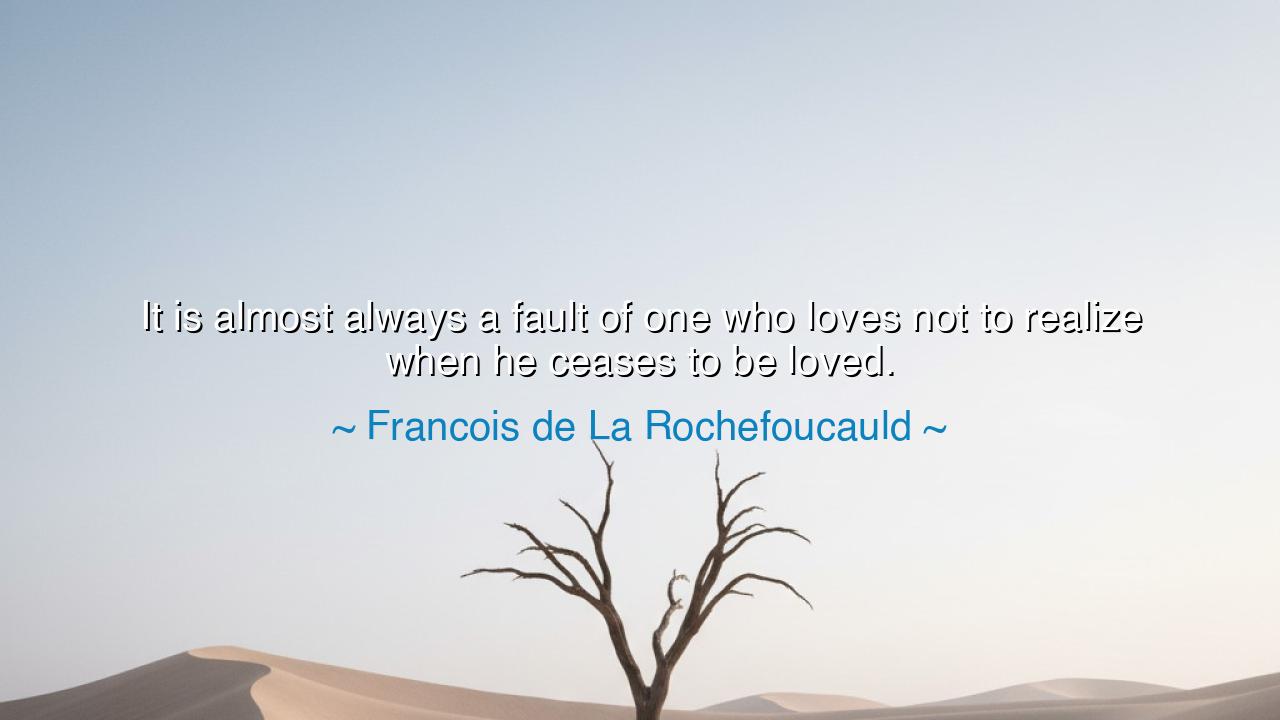
It is almost always a fault of one who loves not to realize when
It is almost always a fault of one who loves not to realize when he ceases to be loved.






Hearken, children of the ages, to the words of François de La Rochefoucauld, the sage of hearts and human folly: "It is almost always a fault of one who loves not to realize when he ceases to be loved." Here lies a teaching of perception, humility, and the subtle blindness that accompanies passion. To dwell in love is a blessing, yet it can veil the eyes, making the heart slow to perceive the shifting currents of affection that sustain or depart.
Know that in these words there is both caution and sorrow. To love deeply without discernment is to risk living in illusion, to cling to warmth that has cooled, and to endure longing unheeded. La Rochefoucauld teaches that the heart must be attentive, vigilant, and honest, lest the one who gives love be consumed by denial, unable to see the truth of the bond slipping away. The ancients would counsel that awareness of change in the heart of another is the measure of wisdom in love.
Yet, consider also the subtle humility required. To recognize that one is no longer loved is a trial, a mirror reflecting both the impermanence of affection and the necessity of self-respect. The fault lies not in the cessation of love itself, but in the failure to observe, accept, and respond with clarity. The heart that refuses to see the truth is trapped in its own desires, blinded to reality and the lessons it imparts.
And behold, there is heroism in perception. To discern the end of affection requires courage and honesty, for to acknowledge the loss of love is to confront sorrow and the vulnerability of the soul. François de La Rochefoucauld’s insight teaches that true mastery of the heart is not only in giving love, but in seeing its limits, guarding the spirit from self-deception, and learning from the truths that loss reveals.
Thus, remember, future generations: love with devotion, yet observe with wisdom. The gift of affection must be tempered with attention to the signs of its endurance or fading. The one who loves and perceives when love departs walks the path of insight, preserving dignity, and learning the eternal lessons of the human heart.
In the end, the ancients would say: let your heart feel deeply, but let your eyes and mind remain vigilant. For it is a fault to remain blind to the cessation of love, and the wise soul knows both the joy of giving affection and the courage to face when it is no longer returned. In this balance lies the eternal teaching of love, loss, and understanding.






DTducthien th
This quote brings up an interesting dynamic—being unaware that love has faded. But what if it’s a defense mechanism? Perhaps the person still in love is protecting themselves from the pain of letting go. In some ways, this seems to speak to human nature, where we may refuse to acknowledge the truth in order to maintain hope. Is it really a fault, or just a natural part of being emotionally invested?
GDGold D.dragon
I think there’s a lot of truth in this quote, but it also makes me wonder—can love truly be one-sided? Maybe the person who stops loving also has a responsibility to communicate that. Is it always the fault of the one who still loves, or is the breakdown of love a mutual failure to recognize change? Shouldn't both people in a relationship be aware of when the dynamics shift?
CBCung Be
I find this perspective really striking. It’s almost like La Rochefoucauld is suggesting that when we’re in love, we become blind to the subtle changes around us. But does this mean the person who fails to notice is at fault, or is it part of the natural course of a relationship? Shouldn’t both people be aware and take responsibility for the state of their feelings?
KKd,dkdkd
This quote really makes me think about how people often hold onto relationships, even when the love isn’t reciprocated. Could it be that we sometimes stay in denial because we fear the emotional pain of accepting the truth? But is it a flaw if we fail to see when we’re no longer loved, or is it just a sign of hope and attachment to someone we deeply care about?